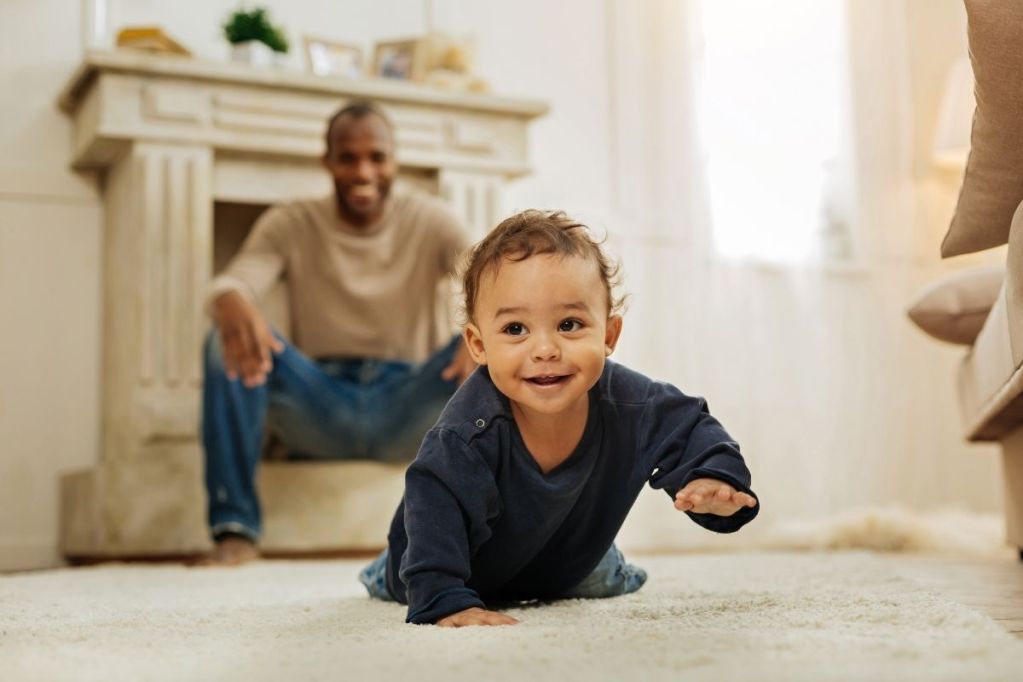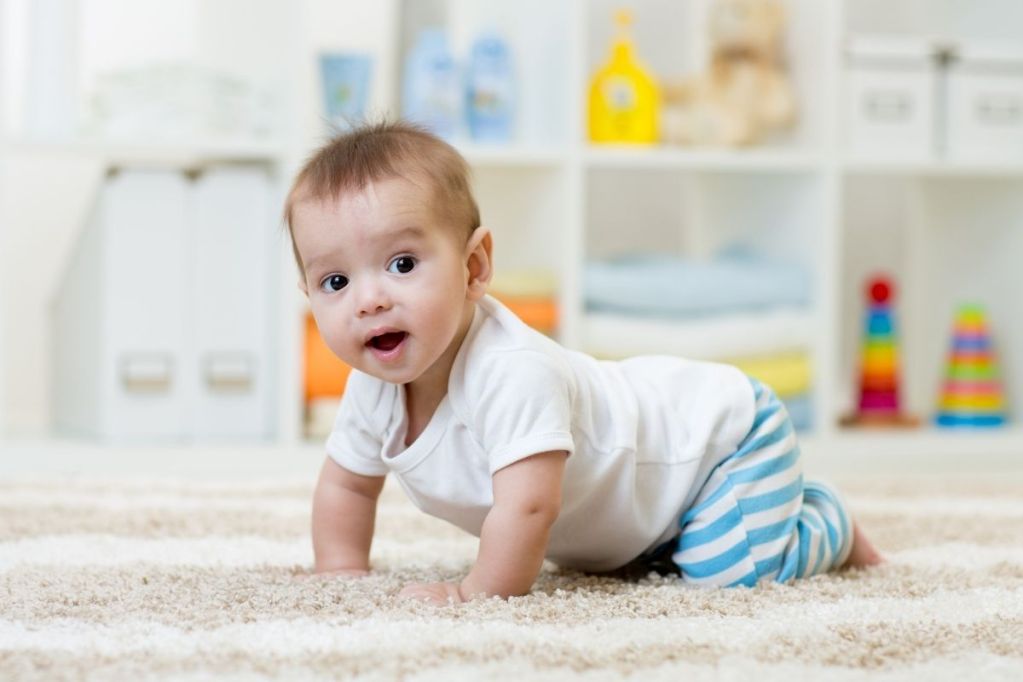
Baby’s first year is full of super exciting milestones. A monumental one is when your little one begins to be mobile by crawling. Crawling opens up a whole new world for your baby as well as you. Of course, with crawling comes a lot of concerns like what is your baby going to get into as well as worries if your guy or gal isn’t. So, at what age do babies crawl? We’ve got everything you need to know about crawling including what to do if your baby hasn’t hit that milestone yet.
At what age do babies crawl
Baby milestones are of course exciting and adorable. Proud parents can’t wait to capture those special milestone moments for themselves, family, and friends. Milestones are important for other reasons though. Milestones like rolling over and crawling build upon one another and eventually lead to walking. According to the Mayo Clinic, most babies begin crawling between seven to nine months. Of course, this is only a range which means some little ones may begin crawling earlier or later. Some babies also skip the crawling stage and move right into cruising. There are different types of crawling too. So, let’s take a look at common crawling questions parents may have about this monumental milestone.
Types of crawling
For the most part, there are five different types of crawling. Just the like age babies begin to crawl, there isn’t a right or a wrong way to do it. The method babies use to crawl is the ideal way for them to do it. These are the basic methods for crawling.
- Classic crawl – This is the method most parents think of where baby is on his or her hands and knees with the tummy up off of the floor.
- Commando or belly crawl – Another common crawling method where babies use their arms to propel themselves while their legs and tummy remain on the floor.
- Bear crawl – Similar to a classic crawl, the bear crawl engages hands and legs, but baby is in more or a pushup position when crawling.
- Crab crawl – With baby in a position much like up dog in yoga, the baby uses the arms to push which makes more of a backward or sideways crawl.
- Leapfrog – Another crawl variation that has baby up on arms and legs, moving forward with more of a pushing motion that almost looks like a jump.
Rolling may not be considered a type of crawl, but it is how many babies get around once they master rolling over. If your baby is a roller, pay special attention to what’s around, so baby doesn’t get hurt.
Why do babies crawl
Babies get a lot out of crawling before walking. It takes a lot of strength and coordination to crawl, and they gain both mental and physical strength from the process. Dr. Rallie McAllister, co-author of The Mommy MD Guide to Your Baby’s First Year, says that crawling takes gross motor, visual-spatial, and cognitive skills. “Crawling babies develop navigation skills and memorize facts,” Dr. McAllister said. “For instance, they’ll learn that they have to go around the coffee table and beyond the recliner to get to the basket of toys.”
Babies want to move, but if they aren’t motivated to crawl, they may find other ways of moving like rolling or cruising. If they can get around, babies might be satisfied with whatever version they end up with, even if that means never crawling before walking. Crawling has specific physical and mental benefits for coordination and muscle development, but it is fine if babies skip this stage.
When to be concerned if baby isn’t crawling
If your baby isn’t crawling at around the 12-month mark, ask your pediatrician about it. Dr. Gwen Dewar says not to be concerned if your baby never crawls and instead skips to walking.
“It’s perfectly normal for babies to skip crawling altogether,” Dr. Dewar said.
Ways to encourage crawling
Tummy time helps babies develop core muscles they need for crawling. In fact, studies have shown that in countries where tummy time isn’t as encouraged as it is in the United States, babies crawl less. Babies with regular tummy time also tend to crawl sooner. The neck and shoulder muscles babies work in tummy time need to be developed to hold their head up to crawl. Giving your baby tummy time is the main way parents can encourage crawling.
You can also entice baby to try moving forward by getting down on the floor with them and encouraging them with smiles and talk to lift their head up in tummy time to look at you. Toys and other motivators help babies enjoy tummy time.
Floor time, in general, is a big help when it comes to encouraging baby to crawl.
“Just hanging out with them on the ground encourages them to crawl or scoot,” explains Dr. Aishwarya Deenadayalu. “Give them the opportunity to try to get to stuff. You can entice them to get to the things they need to get to. It’s nothing fancy. Just having them on the ground is the most important thing.”
When the crawling does start…
At what age do babies crawl? Of course, there isn’t one set time for babies to begin crawling, but most babies hit this exciting milestone between the seven-and nine-months mark. Don’t worry though if your baby crawls later. The best way to encourage baby to crawl is with tummy time. So, make that a fun part of your everyday routine with your baby. When you see your little one is getting ready to take off crawling, don’t forget to baby-proof. It won’t take long for your active crawler to start getting into all sorts of things once he or she is off. If your baby isn’t crawling by the one-year mark, talk to your pediatrician. Remember though, some babies skip the crawling stage and go right to cruising!
Editors' Recommendations
- Understanding baby wake windows is the key to better sleep
- When do babies start talking? Should you be concerned if yours isn’t?
- Why do babies growl? Understanding your little one’s weird sounds
- Flying while pregnant? This is what you need to know
- The ultimate nursery checklist of everything you need (and nothing you don’t)






